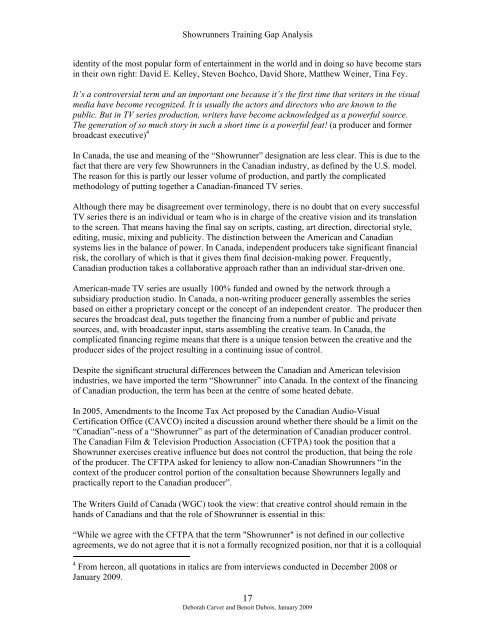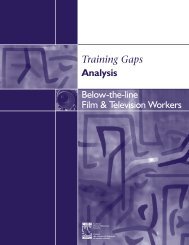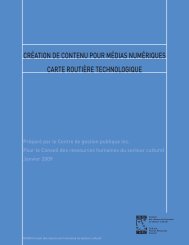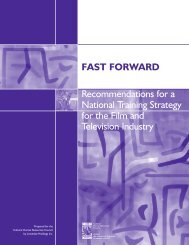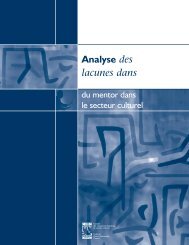Showrunners - Training Gaps Analysis - Cultural Human Resources ...
Showrunners - Training Gaps Analysis - Cultural Human Resources ...
Showrunners - Training Gaps Analysis - Cultural Human Resources ...
Create successful ePaper yourself
Turn your PDF publications into a flip-book with our unique Google optimized e-Paper software.
<strong>Showrunners</strong> <strong>Training</strong> Gap <strong>Analysis</strong><br />
identity of the most popular form of entertainment in the world and in doing so have become stars<br />
in their own right: David E. Kelley, Steven Bochco, David Shore, Matthew Weiner, Tina Fey.<br />
It’s a controversial term and an important one because it’s the first time that writers in the visual<br />
media have become recognized. It is usually the actors and directors who are known to the<br />
public. But in TV series production, writers have become acknowledged as a powerful source.<br />
The generation of so much story in such a short time is a powerful feat! (a producer and former<br />
broadcast executive) 4<br />
In Canada, the use and meaning of the “Showrunner” designation are less clear. This is due to the<br />
fact that there are very few <strong>Showrunners</strong> in the Canadian industry, as defined by the U.S. model.<br />
The reason for this is partly our lesser volume of production, and partly the complicated<br />
methodology of putting together a Canadian-financed TV series.<br />
Although there may be disagreement over terminology, there is no doubt that on every successful<br />
TV series there is an individual or team who is in charge of the creative vision and its translation<br />
to the screen. That means having the final say on scripts, casting, art direction, directorial style,<br />
editing, music, mixing and publicity. The distinction between the American and Canadian<br />
systems lies in the balance of power. In Canada, independent producers take significant financial<br />
risk, the corollary of which is that it gives them final decision-making power. Frequently,<br />
Canadian production takes a collaborative approach rather than an individual star-driven one.<br />
American-made TV series are usually 100% funded and owned by the network through a<br />
subsidiary production studio. In Canada, a non-writing producer generally assembles the series<br />
based on either a proprietary concept or the concept of an independent creator. The producer then<br />
secures the broadcast deal, puts together the financing from a number of public and private<br />
sources, and, with broadcaster input, starts assembling the creative team. In Canada, the<br />
complicated financing regime means that there is a unique tension between the creative and the<br />
producer sides of the project resulting in a continuing issue of control.<br />
Despite the significant structural differences between the Canadian and American television<br />
industries, we have imported the term “Showrunner” into Canada. In the context of the financing<br />
of Canadian production, the term has been at the centre of some heated debate.<br />
In 2005, Amendments to the Income Tax Act proposed by the Canadian Audio-Visual<br />
Certification Office (CAVCO) incited a discussion around whether there should be a limit on the<br />
“Canadian”-ness of a “Showrunner” as part of the determination of Canadian producer control.<br />
The Canadian Film & Television Production Association (CFTPA) took the position that a<br />
Showrunner exercises creative influence but does not control the production, that being the role<br />
of the producer. The CFTPA asked for leniency to allow non-Canadian <strong>Showrunners</strong> “in the<br />
context of the producer control portion of the consultation because <strong>Showrunners</strong> legally and<br />
practically report to the Canadian producer”.<br />
The Writers Guild of Canada (WGC) took the view: that creative control should remain in the<br />
hands of Canadians and that the role of Showrunner is essential in this:<br />
“While we agree with the CFTPA that the term "Showrunner" is not defined in our collective<br />
agreements, we do not agree that it is not a formally recognized position, nor that it is a colloquial<br />
4<br />
From hereon, all quotations in italics are from interviews conducted in December 2008 or<br />
January 2009.<br />
17<br />
Deborah Carver and Benoit Dubois, January 2009


